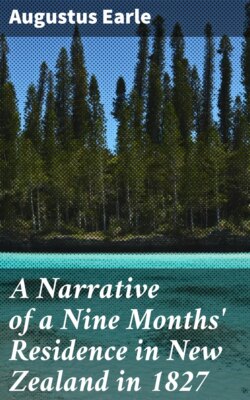Читать книгу A Narrative of a Nine Months' Residence in New Zealand in 1827 - Augustus Earle - Страница 11
На сайте Литреса книга снята с продажи.
THE HOKIANGA RIVER EIGHTY YEARS AGO
ОглавлениеTable of Contents
As our missionary passengers had by this time fixed upon the spot where they intended to establish their settlement, and it being several miles up the river, we got under weigh to proceed thither. The captain's agreement being to that effect, we proceeded with the first fair wind, about twenty miles up the stream, which was as far as we could with safety take the vessel. The shores on each side this noble river are composed of hills gradually rising behind each other, most of them covered with woods to the water's edge. Not a vestige of a habitation is to be seen, and if it had not been for the occasional sight of a canoe, we might have imagined the country to be totally uninhabited. Opposite a small island, or, rather, sand-bank, the vessel grounded, and had to remain there till the next tide floated her off. It was a curious and interesting spot, being a native pa and depot, and was entirely covered with storehouses for provisions and ammunition. The centre was so contrived that all assailants might be cut off before they could effect a landing; and we were all much gratified by the judgment and forethought displayed in this little military work. The next morning we got off, but could not proceed far, as the shoals were becoming so numerous as to render the navigation dangerous. But here we beheld, with both surprise and satisfaction, a most unexpected sight, namely, a snug little colony of our own countrymen, comfortably settled and usefully employed in this savage and unexplored country. Some enterprising merchants of Port Jackson have established here a dockyard and a number of sawpits. Several vessels have been laden with timber and spars; one vessel has been built, launched, and sent to sea from this spot; and another of a hundred and fifty tons burthen was then upon the stocks!
On landing at this establishment at Te Horeke, or, as the Englishmen have called it, "Deptford," I was greatly delighted with the appearance of order, bustle, and industry it presented. Here were storehouses, dwelling-houses, and various offices for the mechanics; and every department seemed as well filled as it could have been in a civilised country. To me the most interesting circumstance was to notice the great delight of the natives, and the pleasure they seemed to take in observing the progress of the various works. All were officious to "lend a hand," and each seemed eager to be employed. This feeling corresponds with my idea of the best method of civilising a savage. Nothing can more completely show the importance of the useful arts than a dockyard. In it are practised nearly all the mechanical trades; and these present to the busy enquiring mind of a New Zealander a practical encyclopaedia of knowledge. When he sees the combined exertions of the smith and carpenter create so huge a fabric as a ship, his mind is filled with wonder and delight; and when he witnesses the moulding of iron at the anvil, it excites his astonishment and emulation.
The people of the dockyard informed me that, although it was constantly crowded with natives, scarcely anything had ever been stolen, and all the chiefs in the neighbourhood took so great an interest in the work that any annoyance offered to those employed would immediately be revenged as a personal affront.
